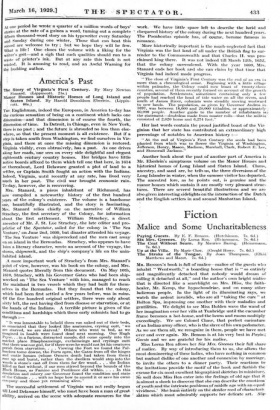Fleet Street from the Inside
Tax anonymous editor of " two weekly journals with an Impeiial Circulation who gives the world this curious story of his struggle began, him Kipps, as an office boy near Brighton. Not yet forty, he has, we are told, an established position in Fleet Street. Resolved to achieve greatness, he has achieved greatness of quantity only, but is satisfied with his success.
He has written four hundred short stories since the War, seven or eight books, and a multitude of special articles, besides editing several papers and working for many more. " If you can't be a good writer, be a prolific one," he urges the aspirant to journalism, who will be left gasping by such candour.
This book is one of the most remarkable, human documents we have come across lately, and is valuable, moreover, as a truthful description of various aspects of journalism. " In my experience," the author tells us, " the University mind does not shine in journalism. Many of the best-known journalists of our generation started life as tape boys, pasting up messages from the tape machines in a newspaper office." Whether this is a desirable state of affairs each reader of the popular Press can judge for himself.
Here is a man whose education can only have been of the slightest, who tells us that he was overworked - and under- nourished in childhood, who seems to have no sport or hobby except pouring out typescript " in chunks of five thousand words at a time," who can hardly have had a minute for
original thought during the whole course of life, and who says that the business of an editor is to have no opinion of his own, but to follow (or if possible anticipate) public taste, fighting his way upward until he has become a power in Fleet Street. How did he get there ? How did he con- trive to publish his probably rather half-baked views in quantities which stagger the imagination ? And how is it that his readers trust him ?
The answer, no doubt, is that this kind of journalism—and especially this kind of editing—is a gift, a sixth sense, rather than an art or craft. The editor of the modem mass-produced popular journal must be a thought-reader of the mass-mind. " Circulation figures talk—in Fleet Street nothing else matters. I knew, or believed I knew, what my readers wanted." He was twenty-four at the time he first occupied the editorial chair of this weekly which has been " a popular favourite with a mighty army of readers in every corner of the British Empire for nearly thirty years "—and he knew what his public wanted. That, and the capacity to give it them hot and strong, were his all-sufficient qualifications. Probably there has never been a plainer or completer statement than that contained in these pages of what the new journalism is really like.
The story is that of a poor boy resolved to succeed. He writes his first article at the age of ten, establishes an adver- tising business at sixteen with a mythical partner to give it weight among the small Sussex business men whose patronage he seeks, is rejected as "..C8-" at the outbreak of war, and conducts thereafter his own hard battles in Fleet Street. At one period. he wrote a-quarter of a -million words-of-boys' stories at the rate of a guinea a word, turning out a complete been thousand-word story on his typewriter every Saturday and Sunday during one winter. Those that can beat this record are welcome to try ; but we hope they will be few. oat a life I One closes the 'volume with a luring for the writer's grit—and a sigh that such qualities should run to a waste of printer's ink. But at any rate this book is not wasted. It is amusing to read, and an Awful Warning foi thg budding author.













































 Previous page
Previous page